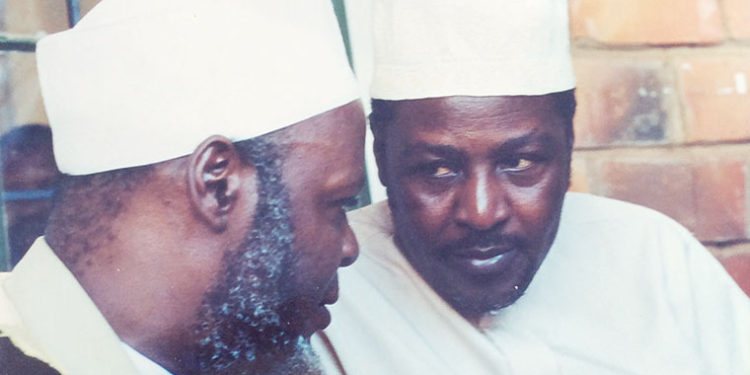By THE OBSERVER UG
On August 7, High Court Judge Harriet Grace Magala rendered a significant decision by rejecting an application from the Uganda Muslim Supreme Council (UMSC). The UMSC had sought unconditional leave to appear and defend a summary suit, which allowed businessman Justus Kyabahwa to auction UMSC’s properties. Unbeknownst to Judge Magala, this ruling would set in motion events challenging Mufti Shaban Ramathan Mubajje’s 23-year leadership since that day.
On November 16, 2023, newspapers featured advertisements announcing the auction of seven prime UMSC properties, including the national mosque at Old Kampala hill. This development prompted widespread concern, drawing the attention of individuals, including President Yoweri Museveni.
In a letter to Chief Justice Alfonse Owiny-Dollo, President Museveni’s comments sparked public outcry due to concerns about judicial interference. The president questioned the rationale behind attaching a place of worship as collateral for debts incurred by officials of the faith.
BACKGROUND
The origin of this crisis traces back to June 24, 2020, when UMSC, represented by former Secretary-General Rama-than Mugalu, Mufti Shaban Ramathan Mubajje, and the late former Chairperson Abdulkadir Idi Balonde, sold a two-square-mile piece of land in Sembabule district to Justus Kyabahwa for Shs 3.584 billion. The agreement stipulated a transfer within 150 days or a refund with a 12 percent monthly interest rate.
Discovering a 15-year lease on the land with Enterprise Handling Services Limited, expiring in 2028, hindered the transfer and refund. Consequently, UMSC faced difficulties, accumulating a debt of Shs 19 billion. In August, the High Court issued an order to attach various UMSC properties for debt recovery, including land, shares, and a plot, excluding the mosque.
PRESIDENT’S INTERVENTION
President Museveni’s letter to Chief Justice Owiny-Dollo expressed astonishment at attaching the National Mosque. He urged a review, emphasizing the illogical attachment of places of worship for debts incurred by faith officials.
MUBAJJE’S CHALLENGE
The president’s response was to a petition from Mufti Shaban Ramathan Mubajje on November 29. Mubajje expressed concerns about the judicial handling of the matter. Many Muslims now believe Mubajje’s leadership is untenable, particularly due to the controversial 12 percent interest rate and the potential auction of the Gadafi National Mosque.
LEADERSHIP TRANSITION
Amidst pressure, the national vice chairman of the NRM party, Hajji Moses Kigongo, convened a meeting to discuss Muslim affairs post-Mubajje. Collaborating with Minister Minsa Kabanda, Kigongo operates with President Museveni’s consent. The key concern is not Mubajje’s retention but the selection of his successor.
Sheikh Abdallah Ssemmambo, interim mufti, was chosen for a six-month term. The selection indicates a shifting dynamic and a possible end to Mubajje’s tenure. The Muslim community’s perception of Museveni’s influence raises concerns about the potential selection of a government official as the new Mufti.
COMMUNITY OPINION
Many Muslims assert that Mubajje’s leadership, tarnished by the recent events, should end. The selection of Sheikh Ssemmambo and the orderly gathering at Gangu Muslim primary school without security interruptions suggest a changing sentiment. Some argue that Ssemmambo’s appointment may lead to security personnel overseeing Mubajje’s eviction.
In an official statement, Dr. Muhammad Lubega, chairman of UMSC, contests the legitimacy of those filing court petitions, emphasizing that resolutions reached are not binding.
HISTORICAL CONTEXT
The establishment of the Office of the Supreme Mufti in Kibuli in 2009 stemmed from a dispute over the sale of Muslim properties, including Masgid Noor. Sheikh Mubajje’s involvement in the sale led to opposition, and a separate leadership emerged.
In conclusion, the unfolding events indicate a significant challenge to Mubajje’s leadership, with implications extending beyond the judicial realm. The Muslim community is grappling with the potential end of Mubajje’s 23-year tenure, navigating a delicate balance between internal decisions and external influences, particularly from the political sphere.







Discussion about this post